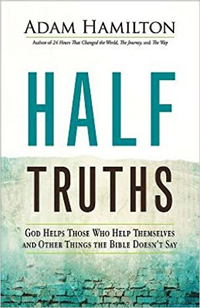 Adam Hamilton, Half Truths: God Helps Those Who Help Themselves and Other Things The Bible Doesn't Say (Nashville: Abingdon, 2016), 174pp.
Adam Hamilton, Half Truths: God Helps Those Who Help Themselves and Other Things The Bible Doesn't Say (Nashville: Abingdon, 2016), 174pp.
Does God help those who help themselves? Isn't that in the Bible somewhere? Well, even though that's a common piece of cultural advice, the answer on both counts is no. Adam Hamilton calls this a half truth. No one would discount the importance of prudence or hard work, but, in fact, the Bible teaches something almost the opposite of this cliche — that God gives us what we don't deserve. He helps the helpless. I think of such aphorisms as junk food theology — something that tastes good, is cheap, and nonetheless bad for you.
In this little book, Hamilton considers five such half-truths. Like "everything happens for a reason" (the Holocaust? School shootings?), or "God won't give you more than you can handle" (see 1 Corinthians 10:13), or "love the sinner and hate the sin." Such statements aren't entirely untrue, says Hamilton, but they simplify otherwise complex issues that require more nuance, and the careful interplay of Scripture, tradition, reason, and experience (the so-called quadrilateral of his United Methodist heritage).
One of the strengths of this book is how Hamilton draws upon his thirty years of pastoral experiences — weddings, funerals, hospital visits, notes from parishioners, and weekly preaching. Like many of his books, this one first took shape as sermons. He prays, he reads his Bible, and he also carefully considers what the Spirit is saying among the people of God. These half-truths cause a lot of unnecessary pain and confusion, and so, as a good pastor, Hamilton ever so gently debunks them. And it's easy to think of many more half-truths beyond the five that he considers.
In 1990, Hamilton founded the Church of the Resurrection in Leawood, Kansas, with four people. Today the COR is the largest United Methodist church in the country with 18,000 members. Along the way, Hamilton has written two dozen books, all of which in their various ways urge what he has elsewhere called a "radical center" that moves beyond the tired debates between evangelical conservatives and mainline liberals. He wants to find a center point between "minimalist" liberalism and "maximalist" conservatism. Elsewhere Hamilton has advanced the language of "liberal evangelical" or "evangelical liberal." His careful thinking and down-to-earth style make all his books worth reading. For more on his ministry and his books, see www.adamhamilton.org.


